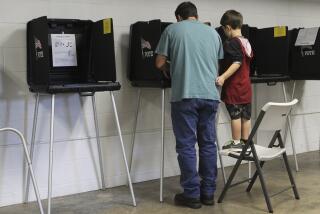GOP House Leaders Agree to Deal on Test of Census ‘Sampling’ Method
- Share via
WASHINGTON — The White House and GOP House leaders crafted a deal Friday that would make Sacramento the laboratory for a controversial counting method the Census Bureau hopes to use to tally the nation’s millions in 2000.
If approved by Congress, the agreement would allow demographers to try “sampling” in a census dress rehearsal in Sacramento next April. But the accord would hardly settle the debate that has entangled lawmakers for months: whether the bureau can resort to such statistical methods to estimate a portion of the population in 2000, or if it must continue to attempt to count every resident one by one.
Indeed, the agreement both opens up legal avenues that could tie up the new method in court indefinitely and makes almost inevitable another congressional clash on the sampling issue next year.
The way the federal government ultimately decides to count America three years from now has huge implications for California, where an estimated 1 million people were missed by the 1990 census, costing the state what officials believe were one congressional seat and $500 million in federal funds.
The Census Bureau says its only hope for a correct count in 2000 is statistical sampling--a method that precisely tallies 90% of the population and uses that number to project the 10% viewed by demographers as nearly impossible to locate.
But the sampling method has taken on dramatic political proportions. The GOP has fiercely opposed the method as “a risky statistical scheme,” saying it violates the constitutional requirement that each of America’s residents be counted. Privately, party leaders worry that sampling would increase the tally of Democratic-leaning voters--minorities and the poor, who tend to be those hard to count.
House Speaker Newt Gingrich earlier promised, “It is our clear intent to kill [sampling] in 1999.”
The dispute over the method became one of the thorny issues that kept Congress from its goal of adjourning Friday for the year. It became a bartering chip in last-minute horse trading between the White House and GOP leaders over expanded trade powers--known as fast-track authority--that President Clinton wants.
Clinton has long threatened to veto the 1998 Commerce, State and Justice departments’ spending bill--which funds the Census Bureau--if it barred statistical sampling, as House Republicans wanted. The Senate approved the method and the House banned it, sending the matter to a conference committee, where efforts to resolve the sampling issue for a final bill have been stuck for weeks.
That committee adjourned Friday without a final vote on the deal, but sources involved in the negotiations said all significant differences had been resolved.
In the end, some Democrats said Clinton buckled on the census in his zeal to win on the trade issue, which may come up for a House vote as soon as today
GOP lawmakers were hailing the deal Friday as a victory that will ultimately lead to a traditional head count in 2000. “This was a win for the Republicans,” one GOP leadership aide said.
The compromise would lift the House ban on sampling pending expedited review by the U.S. Supreme Court. It would free up money the Census Bureau desperately needs to prepare for the April dress rehearsal in three places--Sacramento, 11 counties around Columbia, S.C., and the Menominee Indian Reservation in Wisconsin. The sampling method would be tested only in Sacramento and compared with the results of the traditional techniques used at the other two sites.
But the deal authorizes a $3-million oversight board of seven appointees--four to be named by Republicans and three by Democrats--to review the sampling results.
“They are stacking the deck against us,” said Rep. Carolyn Maloney (D-N.Y.). “They’ll have a $3-million public relations machine and will be able to outvote us” on the board.
Others held out hope that the battle could still be won.
“Sampling opponents will live to fight another day. We’ll have to, too,” said Rep. Christopher Shays (R-Conn.), one of the few Republicans who support the method. (Some Democrats oppose it.)
The political back-and-forth that has gone on more than a week illustrates the deep distrust the GOP holds for the Census Bureau, which it fears will juggle sampling results to favor the Democrats. Census figures are the basis for drawing congressional districts, and Republicans fear that manipulation of the numbers could threaten their hold on the House.
Democrats counter that the Census Bureau’s political neutrality and ethics have been beyond reproach throughout history, citing the agency’s refusal to give President Franklin Roosevelt’s War Department the addresses of Japanese Americans to facilitate internment during World War II.
The problem, they say, centers on the difficultly of counting residents who fail to return the census survey mailed to every household. Those who do not respond--about one-third of the population--are contacted by telephone or by a knock on the door, a sometimes challenging task for census takers who confront barking dogs, locked gates, dangerous neighborhoods and people who are clearly home but won’t answer the door.
The 1990 census missed 10 million people nationwide and counted 6 million others twice, demographers determined after the tally. If it is wrong again in 2000, experts predict that California will lose $1 billion in federal funds parceled out on the basis of the census.
“I can’t think of anything that impacts every single resident in the state of California more directly and for a longer period of time than the census,” said Rep. Xavier Becerra (D-Los Angeles). “Californians pay money to the federal Treasury, and if the census is not accurate, they don’t get their fair share of that money back in defense dollars, education dollars, highway dollars.”
More to Read
Get the L.A. Times Politics newsletter
Deeply reported insights into legislation, politics and policy from Sacramento, Washington and beyond. In your inbox twice per week.
You may occasionally receive promotional content from the Los Angeles Times.










